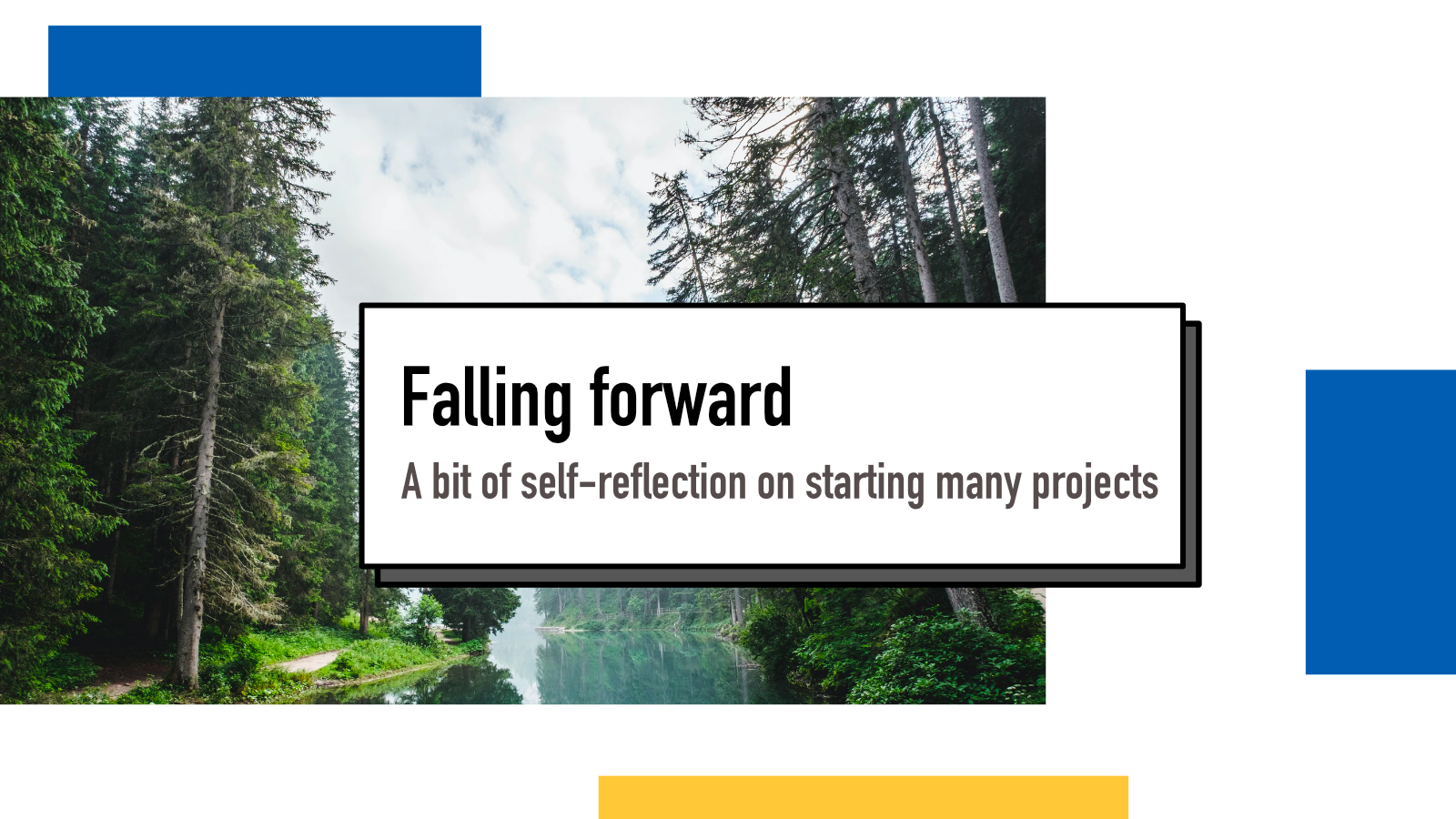Falling forward

This isn't flying, this is falling with style!
It's been over 25 years since Buzz Lightyear and Woody were arguing about the semantics of flying vs falling with style (Toy Story, 1995).
This post is about my personal and professional life, things I've learned and things I might still learn one day. It's not a technical post and it's most definitely not any sort of guidance for how to live your life, that's up to you. But hopefully it gives you some insights into how I see the world and where it has taken me.
When I was a kid in the 90s, I grew up as a rather stereotypical straight A student. I studied hard for two reasons: first was my curiosity towards learning but back then equally strong (if not even stronger) motivation was to avoid failing. In the Finnish school system grading of 4–10, anything below 9 was a catastrophe for me.
A funny sidenote: my mom likes to tell a story of a time when I came home from school (I was maybe 9 or 10) crying because I had gotten a 10- while someone else scored full marks. That's how important it was for me as a kid.
And I'd be lying if those high expectations for myself would have waded away over the years. But something else definitely has. Little by little in my early to mid 20s, I adopted what people would call a growth mindset.
A big factor in that personal growth was the local startup community (huge shoutout to Boost Turku and Aaltoes) and few individual people there. People who believed in me more than I did and pushed me forward to try out things I wasn't certain I'd be great at. Ville, Mikko, Elina – you know who you are – thanks!
I still hate failing
Failing to do something still sucks. Every single time.
But over the past 6-7 years, I've learned to kinda embrace it. These days, I start a lot of new projects (both on my own time and at work) and experiment a lot to see what sticks: what is fun to do, what the community enjoys and I'm very eager to quit them as soon as I see they don't work.
I've learned to embrace my curiosity and excitement for things and ignoring the voices (both my inner critic but also the haters) that keep telling me that "finishing what you start is a virtue". Sometimes it is but being too stubborn to keep doing something that isn't worth it is just silly.
I'm a university dropout because I felt that organizing workshops, teaching programming and helping the local community was more important and valuable than writing a thesis that nobody would read. Surely, it would have been nice to graduate and I probably could have done it if I had prioritized differently but I don't value the degree or finishing something for the sake of finishing that much.
I have a bunch of domains that have a "something's coming" landing page or a redirect to my personal site, so many git repositories of projects I started and stopped working on (for now) and I don't worry about them anymore. If the time is right, I'll get back to them and finish or if I lose interest, I'll drop them all together.
Experimentation leads to success
I'm not especially smart or innovative guy. What I am (and proud of it) is a combination of being stubborn enough to hate failure and willing to experiment with dozens and dozens of ideas before sticking to them. That's how all of my successful projects have been born and that's why they have been so successful.
I've been keeping up with momentum of many projects so that even when I fall with them, I keep stumbling forward to next projects.
Turku ❤️ Frontend turns 6 years old this fall, I ran sports organization(s) for 15 years and have been teaching programming for the past 8 so once I find things that work, I stick to them. Currently I'm also in the early phases of Helsinki Dev Lunch (since Aug 2019) and codebase (since Mar 2021) as well as learning Rust (since Dec 2020) and running a developer newsletter Dev Breakfast (since Aug 2018). And bunch of other stuff that may or may not become something.
As a Developer Advocate, I'm a strong believer in experimentation. Each community is different and unique so you need to do different things with them. Some groups might enjoy and work well in a chat-like environment like Discord or Slack. Others might shine in knowledge bases and forums. The third group can be a local meetup or conference (or lunch group) community. Many can be some combination of these. Building those communities, we need to be constantly experimenting and listening to the community to learn what works and where people would shine. I wrote about an analogy of community building and gardening.
A lot of self-reflection in the pandemic
This past year has been horrible to say the least. And one thing it has forced me to do a lot is reflecting on my life, work and habits and thinking about what makes me happy. And it's been rough not being able to do those things.
So I'm writing a series of these blog posts (like Learning in Public and this) to put some of my thoughts into words for future, post-pandemic me to read.
If something above resonated with you, let's start a discussion about it! Email me at juhamattisantala at gmail dot com and share your thoughts. This year, I want to have more deeper discussions with people from around the world and I'd love if you'd be part of that.